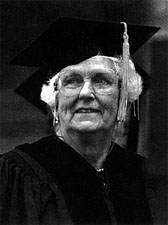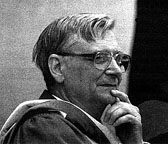Doctor of Letters
In this place of memory and hope where arts and letters flourish, we welcome this writer and activist who has deepened our love of literature and understanding of the human spirit.
A prolific writer of essays, poetry, and short stories, Chinua Achebe is best known for his five novels whose spare and refined prose shows us Nigeria and some of its people. The classic Things Fall Apart appeared in the middle of the Nigerian renaissance in 1958 and gives us a vivid picture of Ibo society in the late nineteenth century. Achebe's powerful use of English as an African language continues in the novel Arrow of God, where the life of the hero, Ezeulu, is both a study of power and the story of a man of great will who cannot adapt to change and is crushed by his own virtues. His most recent three novels give us Africa in the era of independence. In No Longer At Ease, a man leaves the world of the bush behind for the life of a civil servant in Lagos, where he is convicted of bribery and corruption. A Man of the People is another study of a rural man, Odili, who visits the sinful city, is first charmed by it, and then emerges from that experience scarred but with integrity. It is also a study of how a culture devoid of traditional religious belief leads to unrestrained acquisitiveness and unchecked political corruption. After this novel appeared, Nigeria was ravaged by the upheavals and massacres which led to the Biafran War, and for the next twenty years, the writer worked as an activist for Nigerian freedom. Those decades of harsh experience, self-discipline, and clear-eyed realism led to the publication in 1988 of the glorious novel Anthills of the Savannah, a tragic study of how power dies from its own corruption. In this remarkable novel, which was nominated for the Booker Prize, we see his characters and his country from a point of view which is neither idealist nor dishonest.
For his profound understanding of the human spirit and the conflict of cultures, for his stories of Nigerian life which are realistic and just, for teaching us that the novelist's art, like the African oral tradition, must have a moral purpose, and for the pure pleasure of his elegant, impeccable prose, I present Chinua Achebe for the degree Doctor of Letters.
![[Photo: Achebe and Gomes]](citations-achebe-gomes.jpg)
Doctor of Divinity
In this College that has educated so many leaders, activists, teachers, and preachers, it is appropriate that we today recognize a man whose work includes all those professions.
The Reverend Professor Peter John Gomes is an ordained American Baptist minister who serves Harvard University as its minister in The Memorial Church and as the Plummer Professor of Christian Morals in the Faculty of Arts and Sciences and the Divinity School. After graduating from Bates in 1965 and Harvard Divinity School in 1968, he taught history at Tuskegee Institute. He returned to Harvard in 1970 where he has preached and taught ever since. This man is, first and foremost, a preacher. He has preached in the most renowned colleges and universities throughout the United States and Great Britain, themselves churches of reason, and in the most renowned and the most modest of churches with congregations of the faithful. His oratory in service of faith to God has earned him recognition as one of the most distinguished preachers in the United States. He is a scholar who has published broadly in the history of Puritanism, the history of New England, church history, the history of African Americans, church music, and homiletics. His forthcoming book, The Good Book: Discovering the Place of the Bible in Our Lives, will be published this fall. He has provided wisdom and judgment to many institutions as a trustee; he served Bates on its Board of Trustees for nearly two decades, as well as the Public Broadcasting Service, Wellesley College, the Handel and Haydn Society, The Roxbury Latin School, and The Pilgrim Society. In 1992, after a conservative Harvard student magazine condemned and ridiculed homosexuality, he responded by publicly declaring his own homosexuality and explaining with thoughtful exegesis the New Testament's treatment of this matter.
For his eloquent witness to the glory of God and the power of love, for his integrity and lifelong display of principle, and for his belief in the ability of language and thought to draw us to a richer understanding of God's love for us and of our ability to love one another in a civil and just society, I present Peter John Gomes '65 for the degree Doctor of Divinity.

Doctor of Laws
In this College, founded by people who believed in human freedom and who thought that everyone, whatever their race, gender, or class, should be educated to the best of their talents, it is appropriate today that we honor a woman whose life has been devoted to creating an inclusive society.
Natalie Webber Gulbrandsen is president of the International Association for Religious Freedom, the world's oldest interfaith organization, which works throughout the globe to free religion from exclusionary tendencies and to fight religious oppression. The IARF fosters dialogue among adherents of the world's religions, and develops understanding and respect among the world's peoples.
Mrs. Gulbrandsen, who graduated from Bates with a degree in psychology, will celebrate the 55th Reunion of her class this year. She is the mother of five, the grandmother of fifteen, and has hosted many international students in her home. She has given generously to her local community, especially on behalf of children and those in need, through service to the Girl Scouts, the regional mental health association, the Unitarian Universalist Association, the American Field Service, the League of Women Voters, the Wellesley Youth Commission, and many other agencies. She has served Bates in myriad ways and is a longtime advocate for greater diversity at Bates, both in its leadership and in its student body. A religious humanist who believes that the pluralistic faith of Unitarian Universalism gives her the freedom to continue her lifelong search for truth, Mrs. Gulbrandsen exemplifies the kind of servant leadership that has recently begun to be more publicly appreciated, even though our society has long relied on this leadership from remarkable women.
For her commitment to truth and life of service to others, for her steadfast belief in the dignity of the individual and the ability of human beings to seek peace and freedom, and for her example of the ideals of a liberal-arts education, I present Natalie Webber Gulbrandsen '42 for the degree Doctor of Laws.

Doctor of Science
In this place where so many have discovered the pleasures of doing science, it is fitting that today we recognize one of the most thoughtful and original scientists of our time.
A Baptist son of divorced parents from Depression-era Alabama, who attended sixteen schools in eleven years, Edward O. Wilson spent his childhood exploring the woods and swamps of the South with a butterfly net or a snakehandler's stick in hand. The companionship of the natural world offset his loneliness and offered him endless opportunities for discovery, delight, and study. He wrote about these experiences in his autobiography, Naturalist, in elegant, evocative prose. That powerful use of language characterizes all his scientific writing and reminds us how essential the ability to communicate is to the conduct of science.
He has been awarded numerous awards for his work in biodiversity and population biology, as well as two Pulitzer Prizes for his books On Human Nature and The Ants. As the Pellegrino University Professor at Harvard, he has supervised dozens of doctoral students while conducting field research in sixteen countries. He is a champion of biodiversity and is a powerful voice of alarm about species loss. In his work he shows us that the hemorrhaging of biological wealth not only destabilizes ecosystems and squanders priceless sources of medicine, food, and fuel, but also destroys the human soul.
For his creation of new fields of inquiry and his championing of biodiversity, for his commitment to research and discovery, for his taking seriously the power of language, and for his willingness to be a public defender of science and of our biological world against forces of ignorance and shortsightedness, I present Edward Osborne Wilson for the degree Doctor of Science.
All Rights Reserved.
Last modified: 11/21/96 by RLP
